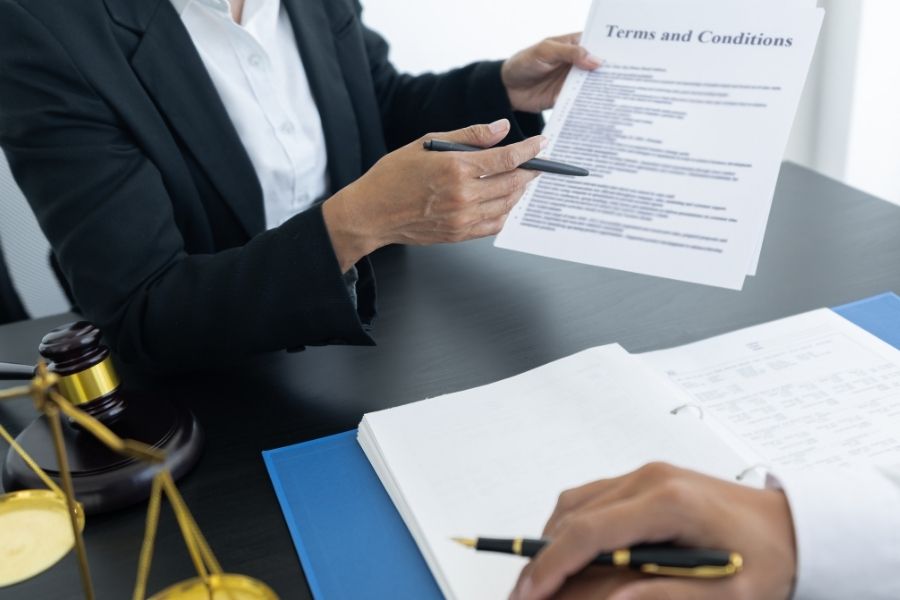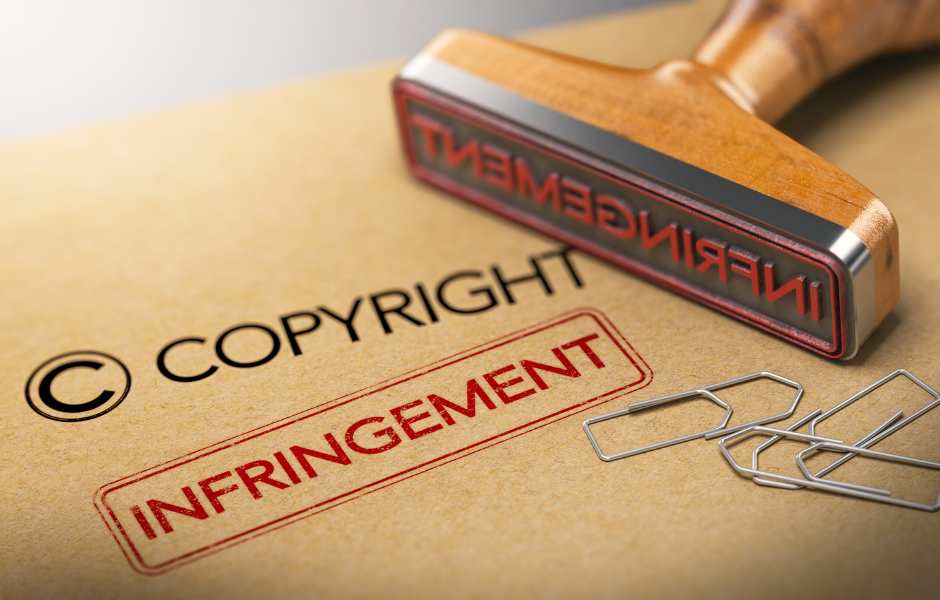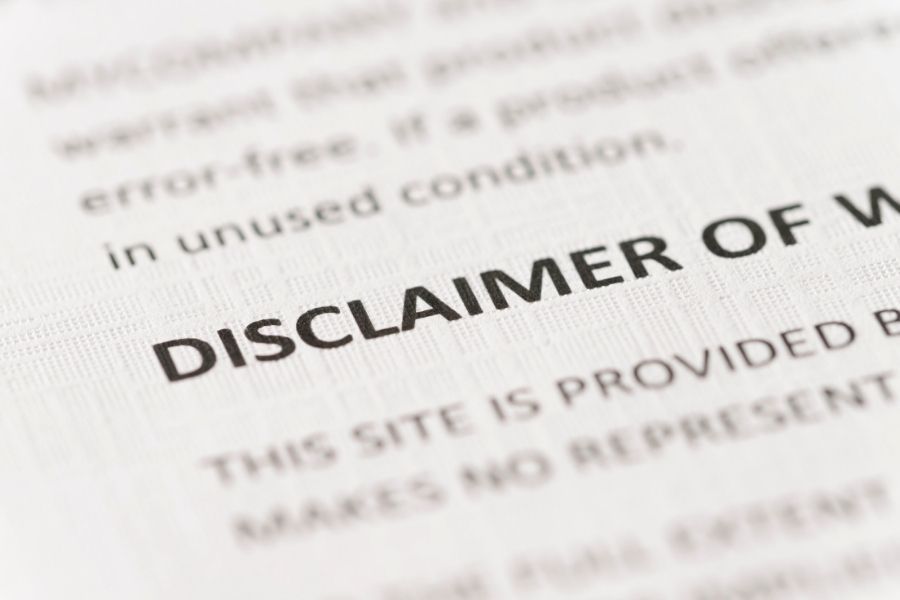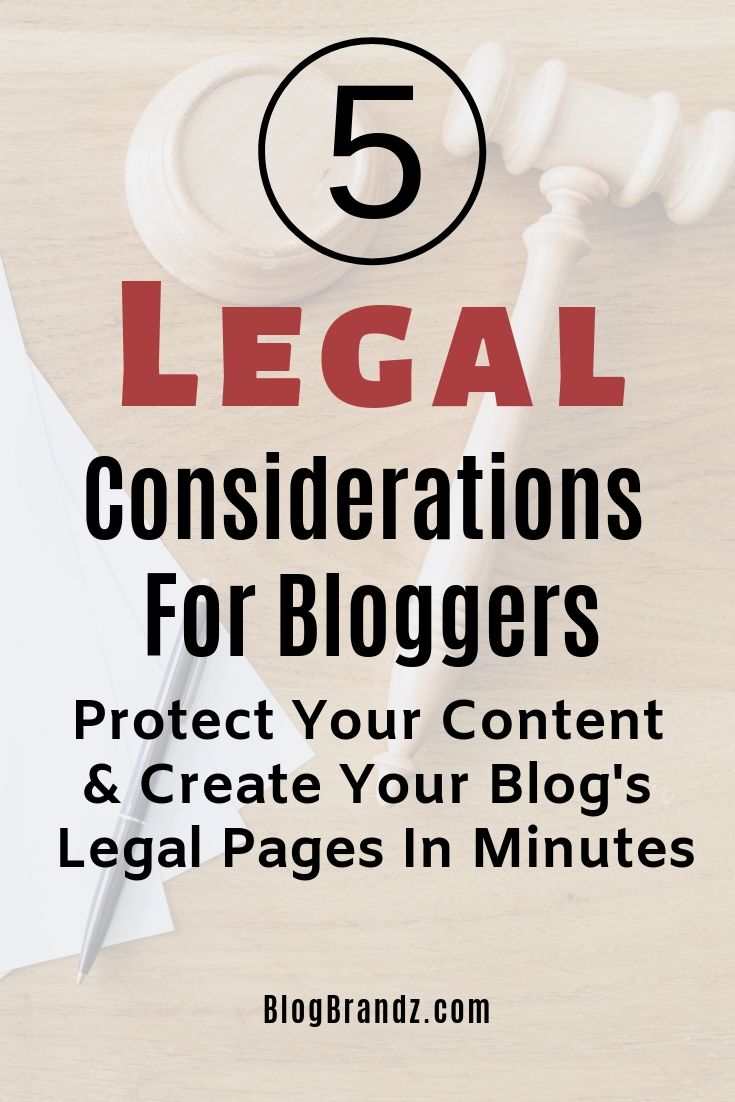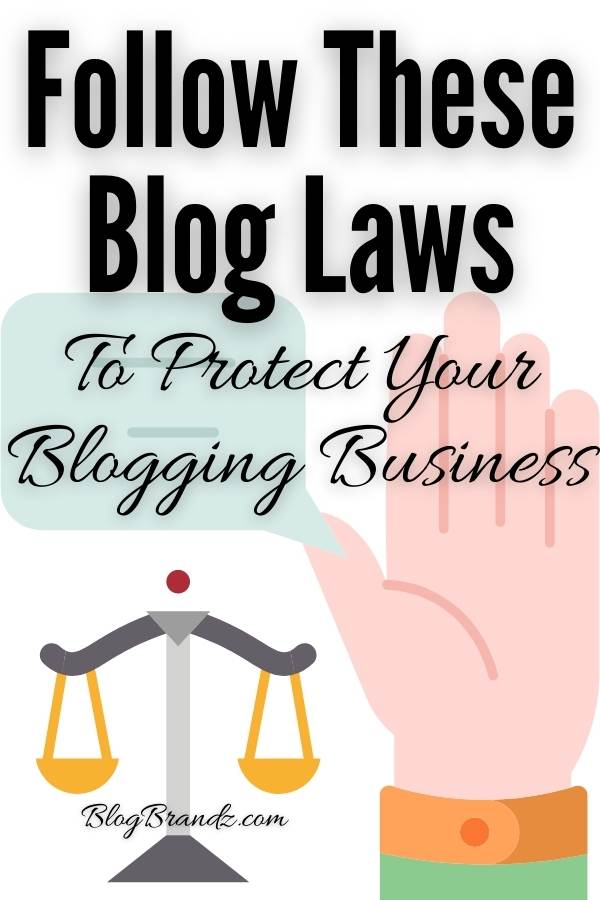Learn how to comply with blog laws and protect your blogging business with legal disclaimers and affiliate disclosures that offer legal protection for bloggers.
Today, there are millions of bloggers and the internet has become a place where people communicate and share copious amounts of information. However, some legal pitfalls come with blogging, and many bloggers have no clue as to how to deal with them.
These legal tips for bloggers will help you implement the website disclaimers and affiliate disclaimer statements you need to be compliant with and understand the blogging rules and regulations and legal considerations for bloggers to avoid running afoul of the blog laws.
Disclaimer: This is not legal advice. This article does not, in any way, constitute legal counsel or advice, but simply discusses legal considerations for bloggers, and provides information on digital content laws for bloggers to protect their blog content, and resources to create their blog’s legal pages and disclaimers.
5 Blog Laws & Legal Considerations for Bloggers
In this article, we focus on some of the blog laws and legal issues that bloggers need to be mindful of, such as creating legal pages for your blog, including website legal disclaimers, and legal considerations for blog content.
#1. Respecting people’s privacy
Revealing personal information about someone is one of the most sensitive legal issues around blogging. Bloggers are not allowed to publish facts that are private about individuals on their blog pages.
A private fact is a detail that highlights certain information about an individual and the individual has not made it public yet. However, what constitutes private facts is a really grey area and it may be hard to tell what is private and what is not.
For example, a person’s romantic affair or sexual orientation might be an invasion of privacy, and publishing it on your blog is an offense. If a blogger wants to post personal details about someone, the safest way to go about it is to stick to re-publishing what is already known to avoid facing a lawsuit.
Bloggers should be aware of defamation laws and ensure they aren’t making any false statements about others that could lead to a lawsuit. If you’re an Indian blogger, the Supreme Court’s recent judgment upholding Sections 499 and 500 of the IPC as constitutionally valid will apply to you.
Resources:
#2. Avoiding plagiarism
As per digital content laws for bloggers, you need to ensure that the content you publish on your blog is not plagiarized or copied from someone else’s blog. Plagiarism involves taking somebody else’s intellectual property and making it your own without their authorization.
Bloggers should be aware that the Digital Millennium Copyright Act of 1998 (DMCA) provides copyright owners with a set of remedies if they find their copyrighted material being infringed upon on the internet.
If you’re found guilty of republishing other people’s work without their consent, you could face a lawsuit for diminishing the value of their intellectual property in the market. These remedies include sending a DMCA takedown notice to the infringing website, which will result in the removal of the infringing content.
In addition, bloggers should be aware that they could be held liable for any copyright infringement on their websites. This means that if someone posts copyrighted material on your blog without your permission, you could be sued by the copyright owner.
To avoid this, have a policy for dealing with copyright infringement.
- What is generally allowed is re-publishing quotes on your blog for the purpose of reporting, commentary, or even research with a link or attribution to the original source of the information.
- What is not allowed is copying and pasting large chunks of information onto your blog without quoting the source or getting prior permission to do so.
Never use copyrighted images without permission. Instead, you can use the free images provided by these royalty-free stock photo providers.
Being sued for infringement of copyright is a serious thing. If you want to use a copyrighted image, you need to get permission from the copyright holder before using it on your blog.
You may be asked to take down the content or to pay royalty fees. If you’re faced with a lawsuit for infringement of intellectual property rights, hire an intellectual property rights lawyer immediately.
Bloggers can obtain a copyright from the original content owners. For example, if they want to publish content from a university, they must contact the university and obtain permission.
Resources:
- Series #2. Copyright and the Copyright Law
- Intellectual Property Security Awareness for Social Media
- Copyright Myths: Public Domain, Fair Use, Creative Commons
- How To Copyright Something: Tips for Content Creators
#3. Protecting your own content
If someone attempts to infringe on your copyright, as per blogs and copyright laws you can ask them politely to cease and desist or initiate a takedown of the content under the Digital Millennium Copyright Act (DMCA).
To prevent your articles from being copied and pasted, you can use a WordPress plugin provided by services like Digiprove that provides online certification of intellectual property and digital content to prove your copyright ownership and other IP rights.
If you want people to be able to copy material from your blog and republish it, save your work under the Creative Commons License, which allows bloggers to republish some of your content, as long as they cite you as the original author.
If your content is published under the Creative Commons License, you can ask the blogger to attribute it to you. If you’re the one who is responsible for the infringement of intellectual property rights, you must attribute it to the original author to avoid a lawsuit.
Resources:
- Copyright Protection for Entrepreneurs (Protect Your Work)
- Copyright Basics: How to Protect Your Work from Piracy
- Copyright Myths: Public Domain, Fair Use, Creative Commons
- How To Copyright Something: Tips for Content Creators
- Indian Copyright Regime: Law and Practice
#4. Disclosure of affiliate links & compensation
If you publish a blog with content that is paid for, sponsored, or contains affiliate links, you’re required by the FTC to provide disclosure about it, by including a disclaimer for affiliate links, otherwise, you would be in legal violation of their disclosure terms.
Bloggers and social media influencers are legally required to disclose any financial relationships they have with the brands or products they write about with an FTC affiliate disclosure statement and place the affiliate link disclosure as close as possible to the triggering claim.
It is usually sufficient to create a disclaimer/disclosure page or include a sentence with such a disclosure in the header of your blog or before the article. Affiliate disclosure statements must also be included in emails, eBooks, or any other form of content where you use affiliate links.
You can even use funny affiliate disclosures if you don’t want to turn off your readers. Here are some important rules to keep in mind:
- Making false statements: Never make false statements about a product or service. If you do so, you could be sued for defamation by the company or individual who manufactures or provides that product or service.
- For Amazon affiliates: Some affiliate programs, such as the Amazon affiliate program, require that you have an Amazon affiliate disclosure above the fold, where it is clearly visible to readers. Amazon affiliates are not allowed to include their Amazon affiliate links in emails or eBooks.
As an affiliate best practice, avoid reviewing products or services that you have not personally tried or sampled. If you’re going to review a product or service, make sure you have actually tried it yourself. If you haven’t tried it or checked out the free trial (at the very least), don’t write about it.
#5. Create your blog legal pages
Why are blog legal pages so important? If you don’t have your website legal pages for bloggers, you’re opening yourself and your blogging business up to legal action for any statements you make.
As a blogger, you must have a privacy policy for blogs, terms and conditions, website disclaimer statements, and any other legal statements required in the state or country in which you operate.
Bloggers are generally required to have three legal pages on their websites:
- Privacy Policy Page
- Website Disclaimer Page
- Terms and Conditions Page
Crafting your website privacy policy
The European Union’s new General Data Protection Regulation (GDPR) is a new regulation designed to protect customer privacy.
It requires websites to update their privacy policy with essential information about how they collect data from customers, as well as what businesses plan to do with it after receiving this personal information.
Bloggers must ensure that they are GDPR compliant by updating their privacy policy to include this essential information about how their website collects and uses customer data.
Irrespective of the size of your online presence, you need a Cookie Banner. This is because the Cookie Law requires that you collect users’ informed consent before storing non-technical cookies (e.g., tracking cookies) on your users’ devices.
Collecting cookie consent in the right way is an important requirement of the EU’s Cookie Law. To collect informed consent for installing cookies, you should show a Cookie Banner when users first visit your site/app.
Your updated GDPR blog privacy document must provide complete disclosure of personal details, as well as an explanation of what business plans are in place if there’s a request for access, correction, or deletion from you partway through using this information gathered within its pages.
You can find a free website privacy policy template for websites or blogs online, or use a free privacy policy generator WordPress plugin for your blog privacy policy, but these may not cover all your regional laws or be accurate, thorough, and up-to-date.
You can also generate a cookie consent banner designed to meet the guidelines of laws like the GDPR, CCPA, and E-privacy along with provider requirements like Google Analytics, Adsense, and more, with no technical knowledge.
iubenda’s Privacy Controls and Cookie Solution is the best way to get your cookie banner, collect cookie consent, and make your website or app compliant with the law, in multiple languages and legislations.
iubenda’s Privacy Controls and Cookie Solution offers bloggers and website owners a complete set of solutions to achieve 100% compliance, in every case, on major compliance points.
Crafting your legal disclaimers
If you’re not a certified expert and don’t have professional credentials on the topics that you write about in your blog – especially if they pertain to YMYL (Your Money or Your Life) topics such as health, law, and finance that require professional expertise – the best practice would be to have an “informational purposes only disclaimer” somewhere on the page to reduce your liability.
For instance, if you’re writing an article that discusses legal considerations for bloggers, you may want to include a legal opinion disclaimer in the article, unless you ARE a legal expert and write an attorney blog.
If you use a no-responsibility disclaimer template, it should be written by a legal expert, not free software that spits out a legal disclaimer for websites. Now, I’m not an attorney and don’t claim to understand disclaimer law.
However, I do know that free legal disclaimers and policies online are often deficient as they’re not drafted by a real attorney, and don’t offer complete legal protection for bloggers, or the peace of mind you deserve.
For example, that free medical disclaimer for website content could prove very expensive if you don’t have a proper website liability disclaimer and your blog content falls afoul of the laws of your country or state.
In addition, these free legal disclaimers may not include the Amazon disclosure and affiliate marketing disclaimer that you need to add to your disclaimer page if you promote affiliate products on your blog.
I’m not a lawyer, so I’m going to recommend Amira’s Legal Bundle For Your Website. These legal disclaimer templates include all you need to complete your blog legal pages and website disclaimers within minutes.
You’ll have complete satisfaction and peace of mind knowing that all these legal templates are actually drafted by an experienced attorney, instead of relying on free policies that don’t provide the same comprehensive legal protections you need for your blogging business.
To stay compliant with all the blog laws and avoid blogging legal issues, follow the blogging rules and regulations above, and always consult a legal professional when required, so you can protect your blogging business, and prosper as a blogger.
Blogging tips & tools
- Intellectual property rights (IPR) primer
- IPR course for social media influencers
- How to copyright something: Tips for content creators
- Journalism ethics guidelines for bloggers
- How to build a WordPress website from scratch
- Earn money from blogs: 10 blog ideas that make money
- How to start an affiliate marketing business
- 10 common affiliate marketing mistakes to avoid
- How do famous bloggers make money blogging?
- Best AI content generator tools for writing AI content
- 10 blogging myths to banish to become a successful blogger
© 2018 – 2024, Priya Florence Shah. All rights reserved.
Priya Florence Shah is a bestselling author and an award-winning blogger. Check out Devi2Diva, her book on emotional self-care for women. In her spare time, Priya writes science-fiction novels and poetry and chills with her two-legged and four-legged kids.
Discover more from Business & Branding Tips
Subscribe to get the latest posts sent to your email.
